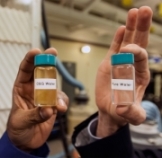A terrifying new article from the Environmental News Network details plans by MIT Engineers to have us drinking the “produced water” from Natural Gas fracking wells.
“Water is always precious. Increased natural gas production is happening in the US. But natural gas wells have problems: Large volumes of deep water, often heavily laden with salts and minerals, flow out along with the gas. That so-called produced water must be disposed of, or cleaned. Once cleaned it has beneficial reuse in often arid regions.
“A process developed by engineers at MIT could solve the problem and produce clean water at relatively low cost. After further development, the process could also lead to inexpensive, efficient desalination plants for communities in the developing world, the researchers say.
“The new technology is described in a series of papers recently published in three journals: the International Journal of Heat and Mass Transfer, Applied Energy and the American Institute of Chemical Engineers’ AIChE Journal. The research is the work of a team including MIT postdoc Prakash Narayan, mechanical engineering professor John H. Lienhard V, and collaborators at King Fahd University of Petroleum and Minerals (KFUPM) in Saudi Arabia.
“The method is a variation of the standard distillation process, in which salty water is vaporized and then condenses on a cold surface; the salt separates out during evaporation. But this process is energy-intensive — and therefore costly — because all the water must be heated to the boiling point, while the condensing surfaces must be kept cold.”
The article continues to describe the process, and how helpful it can be in desalinating ocean water as well. It continues:
“The water and other fluids used to open wells through hydraulic fracturing — also known as fracking — are a somewhat different matter, requiring other kinds of treatment and disposal. But a much bigger issue for the operators of these wells is the ongoing treatment of produced water, which represents a significant expense. This water is typically several times saltier than seawater, which makes it a particularly good candidate for treatment with the HDH process, Narayan says: Unlike membrane-based desalination systems, this system’s efficiency is unaffected by saltier water.
Their next step is to scale up to a plant about two to three times the size of this initial unit, which calculations show should be an optimal size. Narayan says he expects the first commercial plants could be in operation within about two years.”
Reposted from Root Force







 EF! DAM
EF! DAM Ecodefense
Ecodefense




Leave a comment